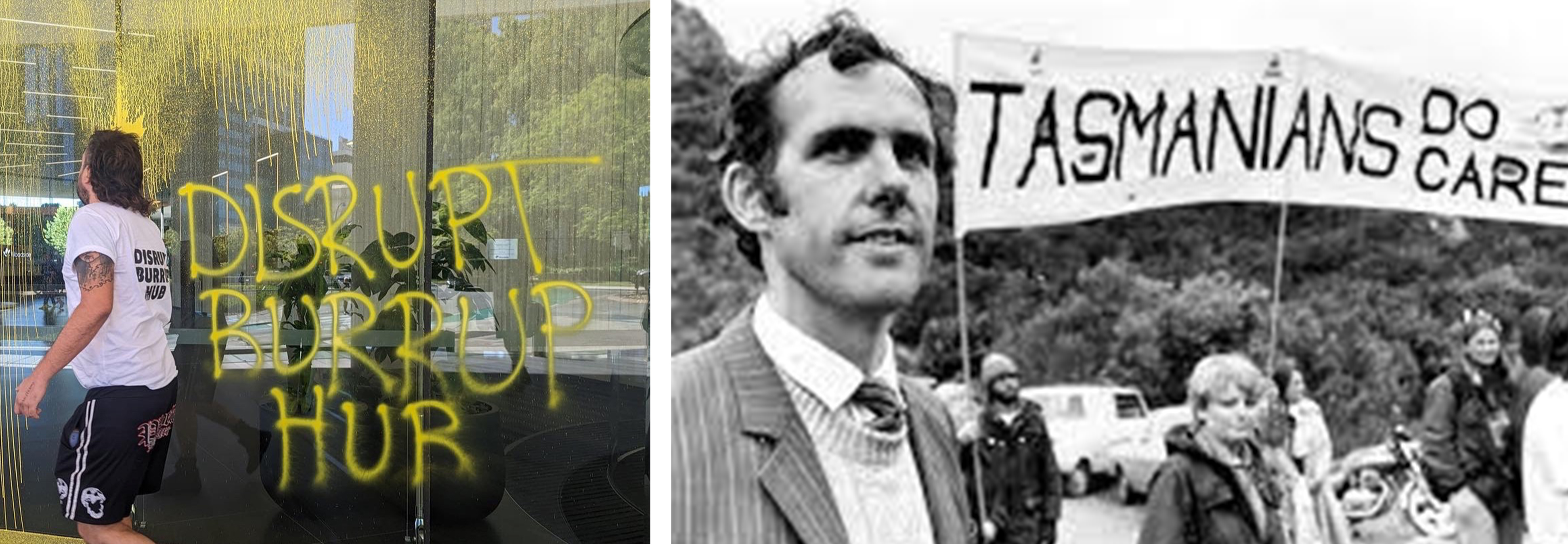From the fight for the Franklin River in Tasmania to the Green Bans of NSW, The Greens have a proud history of protest and activism. But it is not simply a history we should look back on with pride – it’s a legacy that has a critical part to play in our future.
BY NICHOLAS GRINTER-CUMMINS
NSW Greens member
he Greens have a proud history in protest and activism. From the foundations of Bob Brown and the birth of the Greens, activism and protest have forged our identity through action and allowed us to push the boundaries of Australia's political norms.
However, looking to the present, this activism seems to have waned in the face of our growing electoral presence and success. While Greens’ members continue to be an integral part of activism individually, the resources and strength of our organisation are rarely fully present in the planning and marketing aspects of grassroots movements.
This needs to change. Much as it did in the past, activism provides the Greens with a crucial way to shift Australia's political environment and serves as a way to mobilise young Australians through a shared identity of political action.
Over the past several decades the Greens have been a powerful force in Australian politics, pushing the political climate towards environmentalism and equality while forcing both Liberal and Labor to move alongside it. However, in this success, the Greens risk losing their unique position in Australian politics as the drivers of change.
We must continually push forward: not just our personal or party ideals, but the entirety of Australia's political climate.
On-the-ground activism is our greatest advantage in this fight. It allows us to inspire people across the political spectrum to action and pushes hard questions towards parties that cannot be ignored.
Throughout the 1980s and 1990s, the Greens pioneered environmentalism through this method. We allowed voters to grasp an alternative to the floundering responses of the major parties and showed the strength of our ideals in the Australian people. In doing so, we forced the major parties to play by our terms and forged a brighter future for all of Australia.
This strategy is needed once again in our fight towards economic equality and LGBTQI rights. We must start conversations, embolden our allies and illustrate to our opponents that our positions are not those of fringe idealists but the voice of clarity and reason in an increasingly turbulent political environment.
Activism has an important role to play in preventing a backslide towards far-right politics. In NSW and Victoria especially, the streets are an increasingly turbulent place amongst growing racism, homophobia and transphobia.
It is not enough to privately oppose these sentiments. We must both publicly condemn and fight them to protect the rights of our most vulnerable communities. In this fight for change, we must never allow ourselves to lose our agency in our success. The increasing bureaucracy required for a successful nation-spanning party can never be brought about at the cost of our identity and activism.

here is also a key role for activism to play in the mobilisation and recruitment of young Australians. At the moment, we live in a difficult time for young people in Australia. Education is both an expensive and oversaturated commodity; home ownership is a dwindling and often financially crippling endeavour; and the climate catastrophe threatens to destroy what little gains are available to young people.
Now is the time for political action; to strike at the burning resentment in the hearts of young Australians. Young Australians know and often feel the effects of poor policy and brutal price-gouging from those in power the harshest.
Young Australians are discontent. However, these emotions are often buried under layers of apathy and ironic nihilism that must be broken before they can be pushed into action.
Activism and protests are our best responses to this issue. They allow young people a means to seek their own answers and solutions, to see the fruit of their actions, and to remind them that we are never alone in our fight for justice.
For the Greens, the opportunity is there to rapidly expand our youth base and leverage our ability to act beyond compromises and half-kept promises.
Activism is both our most powerful tool as a gateway to greater political action, and a way to reclaim our identity of radical and transformative change in the minds of the youth. When we fail to inspire an expectation of change in our politics, how can we seem surprised when young Australians expect nothing of our politicians?
If we fail to inspire and empower beyond apathy, then we lose our greatest weapon against the major parties' maintenance of the status quo. Activism is our path forward and our greatest strength.
As always, there is much work to be done if we are to rise to meet the calls to action, but we are far from being as helpless as some would make us out to be. We are the third biggest party in this country and if we are committed to our mission we have much to give in terms of bodies, volunteers and awareness.
Activism is not simply a history we should look back on with pride but a legacy that is crucial we continue into the future.